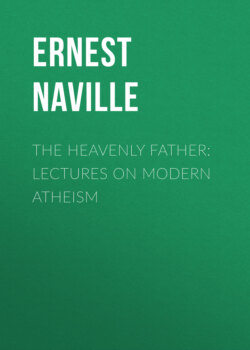The Heavenly Father: Lectures on Modern Atheism

Реклама. ООО «ЛитРес», ИНН: 7719571260.
Оглавление
Ernest Naville. The Heavenly Father: Lectures on Modern Atheism
The Heavenly Father: Lectures on Modern Atheism
Table of Contents
PREFACE
NOTE BY THE TRANSLATOR
FOOTNOTE:
LECTURE I
OUR IDEA OF GOD
FOOTNOTES:
LECTURE II
LIFE WITHOUT GOD
PART I
THE INDIVIDUAL
FOOTNOTES:
PART II
SOCIETY
FOOTNOTES:
LECTURE III
THE REVIVAL OF ATHEISM
FOOTNOTES:
LECTURE IV
NATURE
FOOTNOTES:
LECTURE V
HUMANITY
FOOTNOTES:
LECTURE VI
THE CREATOR
FOOTNOTES:
LECTURE VII
THE FATHER
FOOTNOTES:
THE END
Отрывок из книги
Ernest Naville
Published by Good Press, 2019
.....
Our own past strikes its roots into the historic soil which, in the matter of creeds, is known by the name of paganism or idolatry. At first sight what do we find in the opinions of that ancient world? No trace of the divine unity. Adoration is dispersed over a thousand different beings. Not only are the heavenly bodies adored and the powers of nature, but men, animals, and inanimate objects. The feeling of the holiness of God is not less wanting, it would seem, than the idea of His unity. Religion serves as a pretext for the unchaining of human passions. This is the case unfortunately with religion in general, and the true religion is no exception to the rule: but what characterizes paganism is that in its case religion, by its own proper nature, favors the development of immorality. Celebrated shrines become the dens of a prostitution which forms part of the homage rendered to the gods; the religious rites of ancient Asia, and those of Greece which fell under their influence, are notorious for their lewdness. The temples of false deities, too often defiled by debauchery, are too often also dishonored by frightful sacrifices. The ancient civilization of Mexico was elegant and even refined in some respects; but the altars were stained, every year, with the blood of thousands of human beings; and the votaries of this sanguinary worship devoured, in solemn banquets, the quivering limbs of the victims. Let us not look for examples too far removed from the civilization which has produced our own. In the Greek and Roman world, the stories of the gods were not very edifying, as every one knows: the worship of Bacchus gave no encouragement to temperance, and the festivals of Venus were not a school of chastity. It would be easy, by bringing together facts of this sort, to form a picture full of sombre coloring, and to conclude that our idea of God, the idea of the only and holy God, does not proceed from the impure sources of idolatry. The proceeding would be brief and convenient; but such an estimation of the facts, false because incomplete, would destroy the value of the conclusion. In pagan antiquity, in fact, the abominations of which I have just reminded you did not by themselves make up religious tradition. Side by side with a current of darkness and impurity, we meet with a current of pure ideas and of strong gleams of the day.
Almost all the pagans seem to have had a glimpse of the Divine unity over the multiplicity of their idols, and of the rays of the Divine holiness across the saturnalia of their Olympi. It was a Greek who wrote these words: "Nothing is accomplished on the earth without Thee, O God, save the deeds which the wicked perpetrate in their folly."[6] It was in a theatre at Athens that the chorus of a tragedy sang, more than two thousand years ago: "May destiny aid me to preserve unsullied the purity of my words and of all my actions, according to those sublime laws which, brought forth in the celestial heights, have Heaven alone for their father, to which the race of mortal men did not give birth, and which oblivion shall never entomb. In them is a supreme God, and one who waxes not old."[7] It would be easy to multiply quotations of this order, and to show you in the documents of Grecian and Roman civilization numerous traces of the knowledge of the only and holy God. Listen now to a voice which has come forth actually from the recesses of the sepulchre: it reaches us from ancient Egypt.
.....